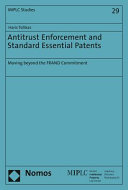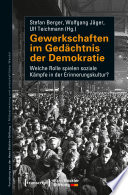Author
McCourt; David M.
Year
2020
Publisher
University of Michigan Press
Type
BOOK
Category
Political Science
Language
English
Pages
311
ISBN
978-0-47213-171-6
Last Update
05-Sep-2024
Keywords
Political Science ; International Relations ; security-studies-discipline
Related
See More
Antitrust Enforcement and Standard Essential Patents, Moving beyond the FRAND Commitment

Containing Iran

Doing Business in Rural China

Cathach of Colum Cille, The: An Introduction

Gewerkschaften im Gedächtnis der Demokratie

Highway Infrastructure and the Economy